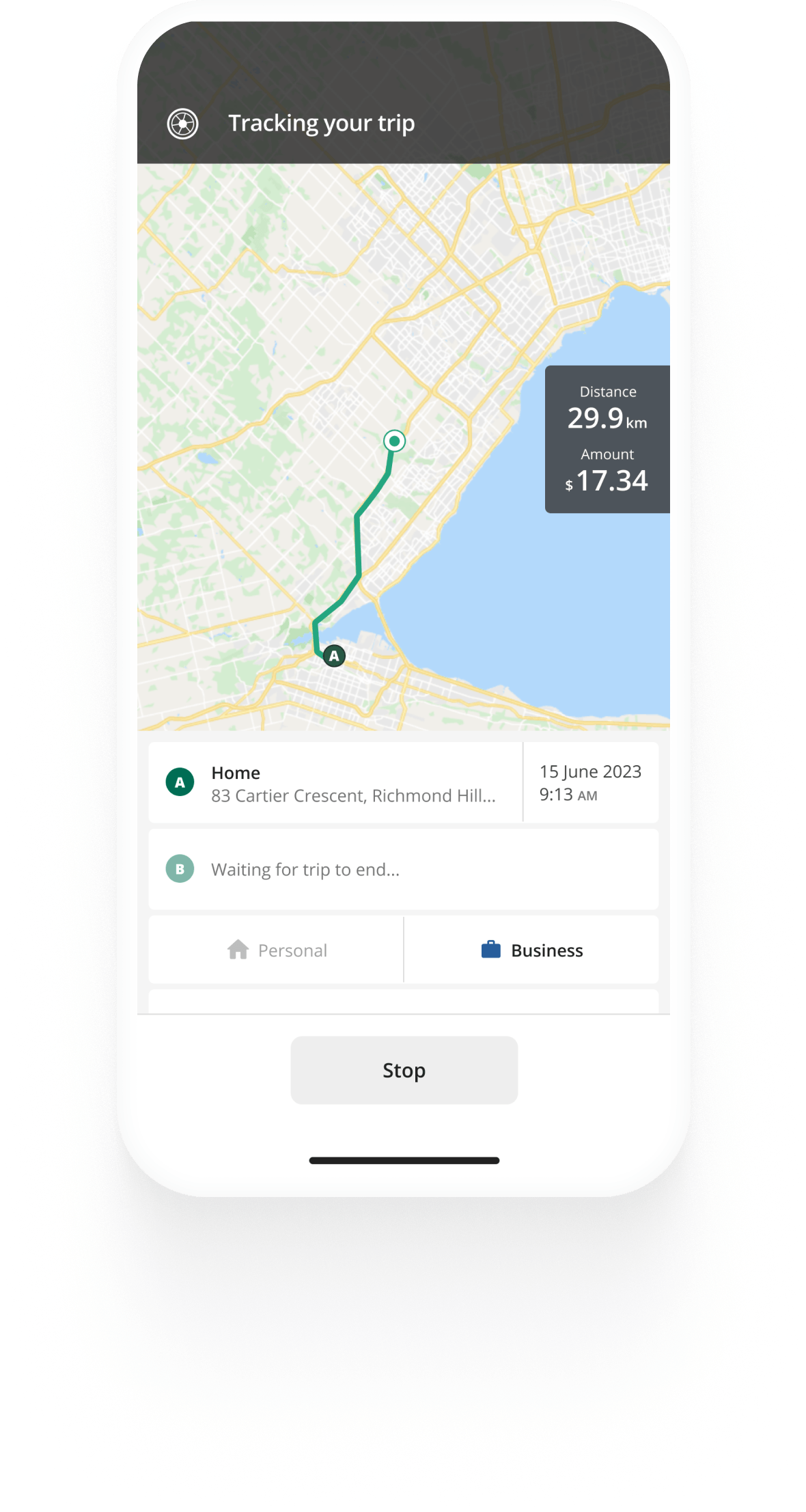Track mileage automatically
Get startedCRA Mileage Log Requirements
When you use your personal vehicle for work-related purposes, you may receive reimbursement for your business kilometres from your employer, or claim mileage from the CRA at tax time. To claim mileage from your employer or the CRA, you need to keep evidence in the form of a mileage log, and in some cases, also car expense receipts.
Mileage log requirements for claiming mileage from an employer
Mileage reimbursement from employers is normally based on the per-kilometre automobile allowance rate set by the CRA. The 2026 CRA vehicle allowance rate is 73 cents per business kilometre for the first 5,000 km and 67 cents afterwards. In the Territories, the rates are 76 cents per km for the first 5,000 km and 70 cents afterward.
While there are no official requirements for a mileage log you provide to your employer, most require some evidence before paying out reimbursements. You will need to log details of your work-related trips, including:
- the date of each trip
- your destination
- what the purpose of the journey is, and
- the number of kilometres driven.
Remember that your employer might ask you to record more details in your mileage log, such as odometer readings, the time of day the trip occurred, and other information.
Read more on mileage for employees in Canada in our dedicated guide.


Track business driving with ease
Trusted by millions of drivers
Automate your logbook Automate your logbook

Automatic mileage tracking and CRA-compliant reporting.
Get started for free Get started for freeMileage log requirements for claiming mileage from the CRA
Self-employed individuals can claim mileage from the CRA using either the full or simplified logbook method.
Employees claiming mileage at tax time must have kept a mileage log for the full year.
Note that if you use your vehicle for business and personal journeys, you will need to record both, not just your business-related mileage. You must record the following details in your mileage log for each trip you take with your vehicle:
- the date
- destination
- purpose
- kilometres driven
Your CRA mileage log must also include your vehicle's odometer readings at the start and end of each year.
To accompany your logbook, you must keep receipts of all car expenses throughout the year. These include:
- licence & registration costs
- fuel and electricity (for zero-emission vehicles)
- insurance
- maintenance & repairs
- leasing costs
- interest on money borrowed to buy the vehicle
If you use multiple vehicles for business purposes, you must keep separate mileage logs and records of each vehicle's expenses.
Full logbook vs. the simplified logbook method for the self-employed
The requirements for your CRA mileage log are the same for both methods. The two ways of claiming a deduction for your business-related driving differ in the period for which you must keep a mileage log.
The full logbook method requires you to keep a mileage log of your driving each year to claim a deduction for your car expenses.
If you use the simplified logbook method, you must keep a detailed logbook for an entire 12-month period, representing your vehicle's typical business use (also called a base year). Each following year, maintain a logbook for a continuous three-month period, which is the sample year period. You can use the base year mileage log to claim your business kilometre deductions as long as the business use of your car and the distances you've travelled during the sample period are within 10 percentage points of the same period in the base year.
Learn more about claiming vehicle expenses from the CRA as a self-employed individual.
CRA mileage log formats
The CRA accepts paper, diaries, account books, digital spreadsheets, CSV files, PDF files, and XLSX (Microsoft Excel) files for mileage claims at tax time. Your employer should tell you what record formats they accept.
Get our free mileage log template.
Consider an automatic solution for recording your vehicle kilometres. An automated mileage tracking app like Driversnote can help you record everything you need to claim your work-related car expenses from the CRA or your employer.
FAQ

Tired of logging mileage by hand?
Effortless. CRA-compliant. Liberating.
CRA Mileage Guide
- For Self-Employed
- For Employees
- For Employers
- Mileage Log Requirements
- How To Calculate Mileage Reimbursement
- Is Car Allowance Taxable?
- Claim Motor Vehicle Expenses In 5 Steps
- Current and Historic CRA Mileage Rates
- Historic Mileage Allowance Rates
- Current CRA Mileage Rates